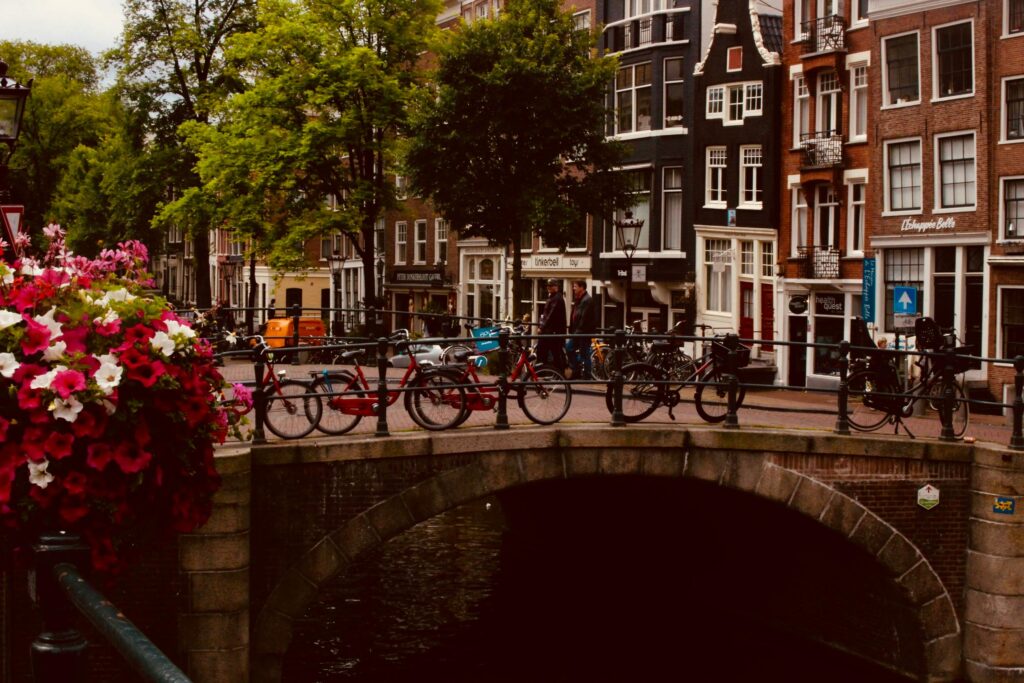
Culture shock isn’t just about being surprised by a new place — it’s about those moments that make you sit back and think, “Huh… maybe I’ve been getting this all wrong.”
For me, that moment happened in Amsterdam — several times, actually.
My Amsterdam Wake-Up Call
I booked a walking tour with a local guide because I wanted to learn more about the city’s history and, let’s be honest, get the inside scoop on why marijuana, psychedelic mushrooms, and prostitution are all legal there. I mean, I knew they were legal. What I didn’t know was why.
That “why” turned out to be the most interesting part: these policies made life safer for locals, reduced crime, and improved quality of life in ways most outsiders never think about.
Somewhere between learning about centuries-old canals and how these laws worked in practice, my guide dropped a line that made me stop in my tracks:
“Americans aren’t as free as they think they are.”
Ouch.
Then I heard it again — this time from a local captain on a canal boat ride. And again later from another local. By the third time, I wasn’t taking notes — I was fuming. I was annoyed, even a little offended. How could they say that?
It took me a while to wrestle with it. But the more I learned about how Dutch laws and society work, the more I saw their point. Their definition of freedom was different — and in many ways, more complete — than the one I’d grown up with in the U.S.
That’s when it hit me: culture shock isn’t just about adjusting to new foods or time zones. It’s about questioning everything you thought you knew.
What is Culture Shock, Really?
Culture shock is that mix of surprise, confusion, and curiosity you feel when you’re in a place where the social norms, language, and daily life are different from what you know.
→ See more on this in my post: Global Awareness Is the Superpower No One Teaches You
It’s not just about big policy differences. It’s in the little moments, too — realizing your “morning coffee” is a tiny espresso served with a biscuit, or that grocery stores close at 5 p.m. sharp, or that strangers stand way closer to you when they talk than you’re used to.
The 4 Stages of Culture Shock
Understanding the four stages of culture shock can help you move through it more easily.
1. Honeymoon Phase
Everything feels new and exciting. You’re wide-eyed, taking photos of every building, and marveling at the differences.
2. Frustration Phase
The novelty wears off, and the differences start to frustrate you. Why is this so complicated? Why can’t it work like it does at home? This is where I was in Amsterdam — questioning the Dutch, bristling at their opinions, and feeling defensive about my own.
3. Adjustment Phase
Slowly, you start to adapt. You pick up a few words in the language, learn the unspoken rules, and maybe even adopt some new habits.
3. Acceptance Phase
You stop comparing everything to home and start appreciating it for what it is. This is where I finally landed — realizing the Dutch weren’t wrong, just different. And in some ways, they might even be more right.
How to Handle Culture Shock
- Keep an open mind. It’s okay to feel uncomfortable — that’s where growth happens.
- Ask questions. Curiosity is your best tool.
- Find a balance between exploring and resting. Culture shock is mentally exhausting, and you may not realize it until you hit a wall. Give yourself permission to take a slower morning, enjoy a long lunch, or spend an afternoon people-watching from a café instead of cramming in one more museum. Often, those in-between moments — the conversations, the realizations — are the stories you end up telling back home.
- Reflect on your experiences. Jot down your thoughts in a travel journal or share them with a friend.
The Takeaway
Culture shock isn’t just an awkward travel phase — it’s a bridge to connection. It forces you to see the world (and your own culture) through a new lens.
→ See more on this in my post: What Does It Really Mean to Travel With Purpose
For me, that moment in Amsterdam was one of the most powerful culture shock experiences I’ve ever had. What started as an irritating, even offensive observation became one of the most important perspective shifts I’ve ever had. And that’s the real gift of travel: it doesn’t just change the way you see other places. It changes the way you see everything.
You might also love:
exploring:
Leave a comment